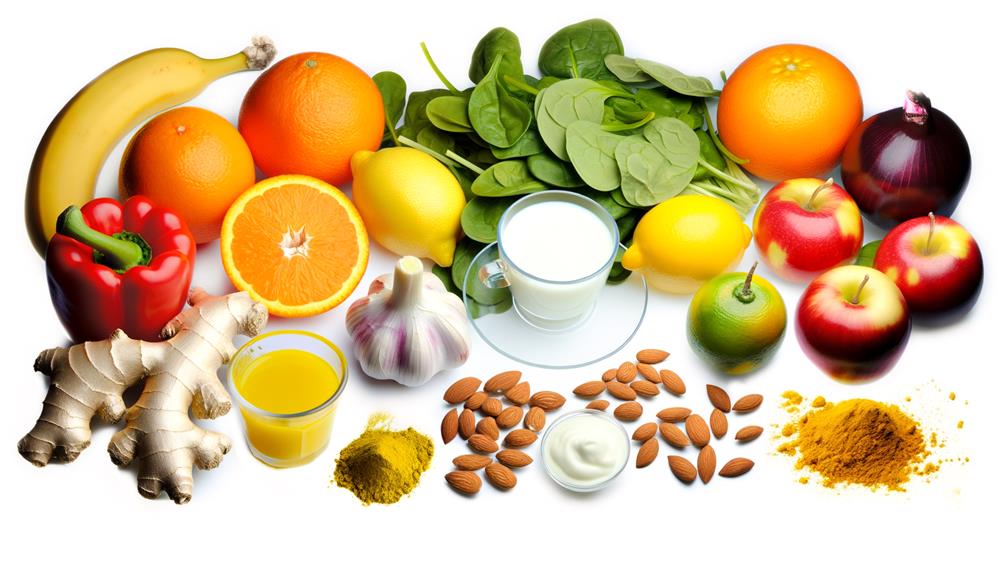In today’s health-conscious landscape, the role of diet in bolstering the immune system cannot be overstated. Foods like citrus fruits, red bell peppers, and garlic not only enrich our meals but also fortify our body’s defenses against illnesses. The intriguing properties of ginger, yogurt, and almonds contribute uniquely to our immune health, offering a blend of anti-inflammatory effects, probiotics, and essential vitamins. However, the benefits of incorporating such nutrient-rich foods extend beyond common knowledge. Exploring how these top ten immune-boosting foods interact with our body’s systems reveals deeper insights into achieving peak health. This naturally leads to the question: what underlying mechanisms make these foods so effective, and how can we maximize their benefits in our daily diet?
Key Takeaways
- Include citrus fruits like oranges for their high vitamin C content, enhancing white blood cell production and skin health.
- Add red bell peppers to meals for triple the vitamin C of oranges and a boost in beta-carotene for immune defense.
- Incorporate garlic in your diet for its antimicrobial properties and ability to stimulate white blood cell production.
- Consume yogurt regularly to benefit from probiotics that strengthen the gut microbiome and enhance immune capability.
- Drink green tea for its high levels of antioxidants, especially EGCG, which supports effective immune cell function.
Citrus Fruits: Vitamin C Powerhouses
Citrus fruits, renowned for their high vitamin C content, serve as crucial allies in bolstering immune function. Oranges, lemons, and grapefruits not only tantalize the palate but also provide a significant boost to your immune system. A single medium orange offers about 70 mg of vitamin C, almost meeting the daily recommended intake of 75 mg for women and 90 mg for men. This nutrient is essential in enhancing the production of white blood cells, which are key warriors against infections.
Beyond their role in immune enhancement, citrus fruits contribute to overall health through their rich antioxidant profiles. These antioxidants combat free radicals, thereby supporting skin health and promoting hydration. Regular consumption of citrus can help maintain a robust defense system and a well-hydrated body, crucial for peak functioning.
Understanding the importance of these fruits in your diet underscores the power of natural foods in maintaining health. Including citrus fruits in your daily regimen not only helps meet your vitamin C needs but also fortifies your body’s natural defenses, empowering you to live a healthier, more vibrant life.
Red Bell Peppers: Antioxidant Rich
Red bell peppers, often overshadowed in discussions of vitamin C sources, boast an impressive concentration of this essential nutrient, with approximately 127 mg per ounce—nearly three times the amount found in a typical orange. This remarkable vitamin C content not only positions red bell peppers as a top contender in antioxidant-rich foods but also amplifies their role in immune support and the reduction of oxidative stress.
Furthermore, red bell peppers are a significant source of beta-carotene. This potent antioxidant is converted by the body into vitamin A, which is fundamental for maintaining healthy skin and mucous membranes. These barriers are critical for shielding against infections, thereby enhancing the body’s immune defenses.
The rich antioxidant properties of red bell peppers help combat oxidative stress and reduce inflammation, which are important processes for maintaining a robust immune system.
Incorporating red bell peppers into a healthy diet promotes nutrient diversity, essential for overall health resilience. Easily integrated into a variety of dishes—from salads to stir-fries to roasted vegetables—red bell peppers not only enrich the flavor profile of meals but also provide substantial health benefits, making them an indispensable component of any health-conscious kitchen.
Be self-reliant with The Doctor’s of Survival Home Remedies. Safeguard your health and protect your loved ones with a comprehensive collection of natural remedies. Don’t wait for disaster to strike – take charge of your health now.
Garlic: Natural Infection Fighter
Garlic is revered not only for its compelling culinary uses but also for its substantial health benefits, particularly in bolstering the immune system.
Rich in compounds like alliin and allicin, garlic enhances immune cell function and exhibits strong antimicrobial properties, which are essential in fighting various infections.
Incorporating garlic into daily meals, through methods such as adding it to salads or using it in dressings, not only elevates the flavor of dishes but also contributes greatly to nutritional health and immune support.
Garlic Health Benefits
Renowned for its immune-enhancing properties, garlic stands out as a powerful ally in the fight against infections. Harnessing the strength of allicin, a potent sulfur compound, garlic acts as a formidable infection fighter, particularly effective against colds and respiratory infections.
Its ability to boost immunity by stimulating the production of white blood cells, the body’s first line of defense, is well-documented in nutritional science. Garlic’s health benefits include:
- Enhanced Immune Function: Garlic boosts the immune system by enhancing the functionalities of white blood cells.
- Antimicrobial Properties: Allicin in garlic provides strong antimicrobial effects, helping to ward off infection.
- Reduction in Infection Severity: Regular garlic consumption is linked to reduced severity of respiratory infections.
- Antioxidant Rich: Packed with antioxidants, garlic combats oxidative stress, thereby supporting overall immune health.
- Flavorful Immunity Boost: Adding garlic to meals not only elevates the flavor but also serves as an easy method to enhance immune protection.
For those seeking to liberate their diet from monotony and embrace health-boosting foods, garlic offers a flavorful way to fortify your health naturally.
Cooking With Garlic
Building on its well-established health benefits, understanding how to effectively incorporate garlic into your cooking can greatly enhance its immune-boosting potential.
Garlic, a staple in global cuisines, is not only a versatile ingredient but also a powerhouse of nutrients. It contains alliin and allicin, compounds renowned for their antimicrobial and immune-boosting properties. These compounds are instrumental in reducing the severity of colds and enhancing the body’s virus-fighting capabilities.
Regular consumption of garlic boosts the production of white blood cells, fortifying the body’s defenses against infections. Integrating garlic into your diet can be effortlessly achieved by adding it to salads, dressings, or as a flavor enhancer in roasted dishes. This not only enriches the flavor profile but also guarantees you gain its maximum health benefits.
For those looking to leverage garlic for its cardiovascular and immune support, consuming it raw or lightly cooked is advisable. Heat tends to diminish its medicinal properties, so minimal cooking is key.
Ginger: Anti-inflammatory Benefits
Ginger, a root celebrated for its culinary and medicinal properties, contains gingerol, a potent antioxidant with notable anti-inflammatory effects. Revered not just for its flavor but also for its health benefits, ginger plays a vital role in promoting overall health and fortifying the immune system.
- Combat Infections: Ginger’s active compounds, including gingerol, help in fighting off pathogens, reducing the risk of infections.
- Enhance Immune Response: Regular intake of ginger can enhance the immune system’s ability to respond more vigorously and efficiently.
- Anti-inflammatory Properties: The anti-inflammatory properties of gingerol aid in reducing inflammation throughout the body, which is essential in preventing various chronic diseases.
- Digestive Health: Ginger aids in alleviating common digestive issues such as indigestion and nausea, thereby improving digestive health.
- Rich in Antioxidants and Vitamins: Ginger is a good source of antioxidants and nutrients like vitamin C, magnesium, and potassium, which are vital for maintaining overall health and boosting the immune system.
Incorporating ginger into your diet through teas, dishes, or fresh root can greatly contribute to your health, aiding in everything from digestive health to immune defense.
Yogurt: Probiotics for Gut Health
Yogurt is esteemed for its rich probiotic content, which fortifies the gut microbiome, thereby enhancing the immune system‘s capability to combat infections.
These benefits are augmented by yogurt’s nutrient profile, which includes essential components like vitamin D, known for its role in reducing viral infection risks and bolstering overall immune health.
Particularly, Greek yogurt offers additional advantages due to its higher protein and lower sugar content, making it a superior choice for supporting both gut health and immune function.
Benefits of Probiotics
Probiotics, particularly those found in yogurt, play a significant role in maintaining gut health and boosting the immune system. These beneficial bacteria, when sourced from products containing “live and active cultures,” are essential in orchestrating a balanced gut microbiome.
This balance directly influences overall health by enhancing immune responses and supporting the body’s defense mechanisms against pathogens. Key benefits of probiotics found in yogurt include:
- Gut Health Maintenance: Probiotics help in maintaining a healthy gut environment, which is necessary for ideal digestive health and nutrient absorption.
- Immune System Support: By balancing the gut microbiome, probiotics contribute to a stronger immune system, capable of effectively combating infections.
- Reduction in Respiratory Infections: Regular intake of probiotics has been linked to reduced severity and duration of respiratory infections.
- Enhanced Nutrient Absorption: A healthy gut flora increases the efficiency of nutrient uptake, essential for overall health and immune support.
- Source of Vitamin D: Yogurt not only provides probiotics but also vitamin D, which is important for immune function and may lower the risk of viral infections.
Incorporating yogurt into your diet can therefore be a strategic move to enhance digestive health and bolster immune defenses.
Enhancing Immune Response
Building on the foundation of digestive health supported by probiotics, we focus now on how these beneficial bacteria, particularly from yogurt, enhance the immune response.
Yogurt, rich in “live and active cultures,” plays a vital role in maintaining a healthy gut microbiome, which is essential for a robust immune system. These probiotics help boost the immune system by stimulating the production of immune cells like T lymphocytes and enhancing the body’s ability to produce antibodies. This dual action not only improves immune response but also helps reduce infections, particularly respiratory ones.
Regular consumption of yogurt contributes greatly to gut health, creating an environment that optimizes nutrient absorption and bolsters immune defenses.
The presence of vitamin D in yogurt further supports this enhancement, as it is essential for regulating immune response and reducing the risk of infectious diseases.
Through the strategic intake of yogurt, individuals can fortify their body’s natural defenses, thereby ensuring a more resilient immune system.
Yogurt Nutrient Profile
Delving into the nutritional content of yogurt reveals its essential role in promoting gut health and supporting immune function. This dairy product is not just a creamy delight but also a powerhouse of necessary nutrients that enhance the body’s defense mechanisms.
The presence of probiotics in yogurt, especially strains like Lactobacillus and Bifidobacterium, is significant. These beneficial bacteria fortify the gut microbiome, which in turn bolsters the immune system and improves our resistance to infections.
Here are key nutrients found in yogurt that contribute to its health benefits:
- Probiotics: Support gut health and stimulate the immune response by enhancing the gut microbiome.
- Calcium: About 20% of daily needs per serving, essential for bone health and important cellular functions.
- Vitamin D: Helps regulate the immune system and is linked to a lower risk of respiratory infections.
- Protein: Particularly high in Greek yogurt, supports muscle health and overall immune function.
- Live cultures: Aid in the digestion and absorption of nutrients, further supporting immune health.
Including yogurt in your diet can be a strategic move to boost your immune health, thanks to its rich composition of nutrients and probiotics.
Almonds: Loaded With Vitamin E
Almonds are a powerhouse of nutrition, especially revered for their high vitamin E content, which meets 100% of the daily recommended intake in just a half-cup serving. This essential nutrient acts as a potent antioxidant, vital for maintaining cell integrity and enhancing the immune system. Vitamin E’s role in promoting heart health and managing blood sugar levels makes almonds an excellent choice for a nutrient-dense snack.
Beyond vitamin E, almonds are rich in healthy fats, fiber, protein, and minerals like magnesium and calcium, all of which contribute to a balanced diet and further bolster immune function. Regular inclusion of almonds in the diet, particularly for older adults, can be significant in boosting the body’s ability to ward off infections.
Here is a concise nutritional breakdown:
| Nutrient | Benefit |
|---|---|
| Vitamin E | Enhances immune response |
| Healthy Fats | Supports heart health |
| Fiber & Protein | Regulates blood sugar levels |
Incorporating almonds into your diet can be a liberating step towards ideal health, empowering your immune system and overall well-being through simple, everyday snacks.
Be self-reliant with The Doctor’s of Survival Home Remedies. Safeguard your health and protect your loved ones with a comprehensive collection of natural remedies. Don’t wait for disaster to strike – take charge of your health now.
Turmeric: Curcumin’s Immune Boosting
Turmeric, powered by the active compound curcumin, offers significant immune-boosting properties, including antiviral effects that help fend off infections. Regular consumption of turmeric, especially when combined with black pepper to enhance curcumin absorption, can mitigate chronic inflammation, a common trigger of weakened immune defense. Integrating turmeric into daily meals can therefore play a pivotal role in maintaining a robust immune system and overall health.
Curcumin’s Antiviral Properties
Curcumin, the active compound found in turmeric, exhibits considerable antiviral properties, which have been documented across several scientific studies. This potent component not only helps in suppressing the replication of viruses but also enhances the body’s immune response, making it a valuable ally in the fight against viral infections.
Here are the key aspects of curcumin’s antiviral properties:
- Immune Cell Activation: Curcumin boosts the function of immune cells, such as T-cells and macrophages, essential for a robust immune defense.
- Enhancement of Respiratory Health: Studies indicate curcumin’s potential in protecting against viral-induced lung inflammation, thereby supporting respiratory wellness.
- Anti-inflammatory Benefits: By reducing inflammation, curcumin aids in alleviating the impact of infections on the body.
- Increased Bioavailability with Black Pepper: Consuming curcumin with black pepper, which contains piperine, considerably enhances its absorption and effectiveness.
- Wide Antiviral Activity: Research highlights curcumin’s ability to inhibit a range of viruses, contributing to its thorough protective effects.
Incorporating turmeric enhanced with black pepper into your diet could fortify your immune system, particularly beneficial in maintaining respiratory health and defending against viral attacks.
Reducing Inflammation With Turmeric
While many spices are celebrated for their flavor, few can claim the considerable health benefits that turmeric offers, particularly through its component curcumin, known for its anti-inflammatory effects.
Curcumin, the active compound in turmeric, markedly contributes to the modulation of immune function. Research highlights its ability to reduce inflammation by inhibiting the production of inflammatory markers, essential in managing chronic inflammation linked to a spectrum of health issues such as autoimmune diseases and cancer.
Further studies underscore curcumin’s capacity to enhance the activity of immune cells, including T-cells and B-cells. These cells play a vital role in the body’s defense mechanisms against infections, aiding in maintaining robust immune health.
By actively reducing inflammation, curcumin helps preserve the integrity of immune cells, thereby optimizing their function and bolstering the body’s ability to resist and fight infections.
The integration of turmeric into one’s diet not only promises a boost in immunity but also a proactive approach to controlling inflammation. This makes turmeric an invaluable addition to dietary practices focused on long-term health maintenance and disease prevention.
Turmeric in Daily Diet
Understanding the health benefits of turmeric, particularly its active component curcumin, naturally leads to the practical consideration of how to incorporate this spice into everyday meals to harness its immune-boosting properties.
Turmeric, celebrated for its potent anti-inflammatory and antioxidant qualities, plays a key role in enhancing immune function. Curcumin, the star compound in turmeric, has been shown to influence the activity of immune cells like T-cells and macrophages, essential for a robust immune response. Additionally, it boosts the production of anti-inflammatory cytokines, which are important in managing inflammation—a common root of various chronic ailments.
To effectively integrate turmeric into your healthy diet and maximize its benefits:
- Add to Smoothies: Blend a pinch of turmeric into your morning smoothie for a healthful start.
- Golden Milk: Stir a teaspoon of turmeric powder into warm milk along with a dash of black pepper to enhance curcumin absorption.
- Season Roasted Vegetables: Sprinkle turmeric on vegetables before roasting to add flavor and nutrients.
- Turmeric Teas: Brew a comforting cup of turmeric tea, perhaps with ginger, to soothe and protect.
- Incorporate in Soups: A spoonful of turmeric can enrich the flavor and health properties of your favorite soups.
These simple additions to your diet can greatly aid in bolstering your immune system within the framework of a thorough healthy lifestyle.
Green Tea: Packed With Antioxidants
Green tea, a beverage revered for its healing properties, is particularly rich in flavonoids and antioxidants, including the powerful epigallocatechin gallate (EGCG). These compounds are instrumental in bolstering the immune system, primarily by enhancing the production and efficacy of immune cells. This fortification helps the body’s defense mechanisms actively combat infections and maintain systemic health.
The antioxidants in green tea, especially EGCG, play an essential role in protecting cells from oxidative stress, a pervasive issue that can compromise immune function and overall health. This antioxidant activity not only supports the immune cells in functioning effectively but also mitigates inflammation, which is often a response to various pathogens.
Moreover, green tea contributes to hydration, which is significant for maintaining immune health and efficient metabolism. Its potential antiviral properties have also been highlighted in research, showing green tea’s ability to inhibit the growth of certain viruses at a molecular level.
Regular intake of green tea, consequently, not only provides essential hydration but also empowers the immune system to ward off and fight infections, thus enhancing the body’s natural defense mechanisms. This makes green tea a potent ally in maintaining immune resilience.
Spinach: Versatile Vitamin Source
Spinach’s nutrient-rich profile makes it an invaluable component of any diet aimed at strengthening the immune system. Packed with vitamin C, antioxidants, and beta carotene, this leafy green not only supports immune health but also serves as a versatile ingredient that can elevate various dishes.
Its role in promoting a healthy immune system is backed by its high content of essential nutrients like vitamin A and folate. Here are key benefits of incorporating spinach into your diet:
- Rich in Vitamin C: A single cup of raw spinach contains about 56 mg of vitamin C, which is vital for immune defense.
- High in Antioxidants: Spinach helps combat oxidative stress and reduces the risk of chronic diseases.
- Contains Beta Carotene: Converts to vitamin A in the body, enhancing the infection-fighting ability of our immune systems.
- Enhances Nutrient Absorption: Consuming spinach raw or lightly cooked preserves its nutrients, maximizing health benefits.
- Flexible in Recipes: Easily added to smoothies, soups, and omelets to boost your immune system.
Kiwi: Full of Essential Nutrients
Kiwi’s impressive nutrient profile makes it a standout choice for enhancing immune function. Each medium kiwi packs about 71 mg of vitamin C, essential for boosting the activity of white blood cells and fortifying the immune system. This fruit’s high vitamin C content is more than just a simple immune booster; it plays an important role in combating oxidative stress and inflammation, thanks to its rich array of antioxidants.
Beyond vitamin C, kiwi is abundant in other important nutrients such as vitamin K, vitamin E, potassium, and fiber. These components collectively contribute to a nutrient-dense food option that supports overall health and wellness.
The fiber in kiwi is particularly significant for its role in promoting gut health—a key factor in maintaining a robust immune system.
Integrating kiwi into a healthy diet is straightforward and enjoyable. It can be savored fresh, blended into smoothies, or used as a revitalizing topping for yogurt and salads.
Regular consumption of this nutrient-packed fruit can lead to improved digestion and enhanced immune responses, making kiwi a valuable addition to a diet aimed at health liberation and immune resilience.




